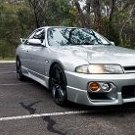Turbo Rebuilder - Who?
Announcements
-
Similar Content
-
Latest Posts
-
By shubby0901 · Posted
Its been a while! Finally thought to do something on this car, so here we go. This will be a slow burning, multiple posts as I spend 0.5-1hr a day on this job, over multiple days... Full set of GKTech suspension arms! Step 1: Buy Arms, done! Step 2: Start removing stuff. HICAS was easy. Rear suspension arms are now gone, they were a bitch but breaker bars with long handle extensions, 2 1.5hr slots later, stock arms are off! Next step, remove the hubs and take them to work to press out the bearings and bushings! -
I guess. The diff and the speedo are gearbox agnostic.
-
@GTSBoy sorry I still am unable to pm direct
-
So I'm.about rhe manual swap my 34gt sedan, I've already done a +T I'm just wanting to clarify that I'm not goin to need to do anything with a speed sensor on the box for the speedo to still operate as it is supplied a signal from the diff correct?




Recommended Posts
Create an account or sign in to comment
You need to be a member in order to leave a comment
Create an account
Sign up for a new account in our community. It's easy!
Register a new accountSign in
Already have an account? Sign in here.
Sign In Now